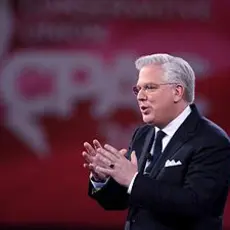We have written about the ways that Tea Party candidates, Religious Right leaders like David Barton, and pundits like Glenn Beck have been promoting the idea of a divinely-inspired American Exceptionalism, and attacking President Obama for being an enemy of exceptionalism who is out to destroy it.
A new survey released this week by the Public Religion Research Institute makes it clear that there’s fertile ground for politically exploiting this concept, especially among Republican voters. When voters were asked whether they agree or disagree with the statement that “God has granted America a special role in human history,” 58 percent of Americans agree. Not surprisingly, white evangelicals agreed overwhelmingly – 83 percent – along with 76 percent of those who identify with the Tea Party movement and 75 percent of Republicans. Among Democrats, about half – 49 percent – agree. More than two thirds of Americans with no religious affiliation reject the idea that God has given the US a special role in history. Perhaps more interesting is the survey’s findings that white Americans who affirm this notion of divinely inspired American exceptionalism are much more likely to favor military strength over diplomacy as the best way to preserve peace than those who reject exceptionalism, and significantly more likely to believe that torture can be justified. Americans are about evenly split on the question of whether torture can ever be justified against suspected terrorists, but only about a third of Republicans and those identifying with the Tea Party agree that torture can never be justified. Fifty-five percent of those who believe in a divine role for the US believe torture can sometimes be justified; only 42 percent of those who reject that role are willing to accept torture under some circumstances. It’s worth noting that half of white evangelicals believe that torture can never be justified, making this one among several issues in which Tea Party supporters are to the right of other Christian conservatives even though there is major overlap between the two groups. E.J. Dionne and William Galston of the Brookings Institution, in a paper commenting on the survey findings, note that “While white Christian conservatives and Tea Party supporters are in broad agreement on many issues, there is a harder edge to Tea Party views on immigration, multiculturalism, and Islam.” Those differences could contribute to the ongoing public struggles to define what the 2010 election meant and what kinds of issues should be considered part of the Tea Party agenda. The crucial role played by Latino voters in Democratic Senate victories in Nevada, California, and Colorado also point to ways in which the Tea Party movement’s hard-edge positions on immigration and Islam, and its lack of concern about racial discrimination, could interfere with efforts by some GOP and Religious Right leaders to broaden the demographic base of the Republican Party.Believers in American Exceptionalism More Likely to Support Torture
On the Watchlist
On the Watchlist





